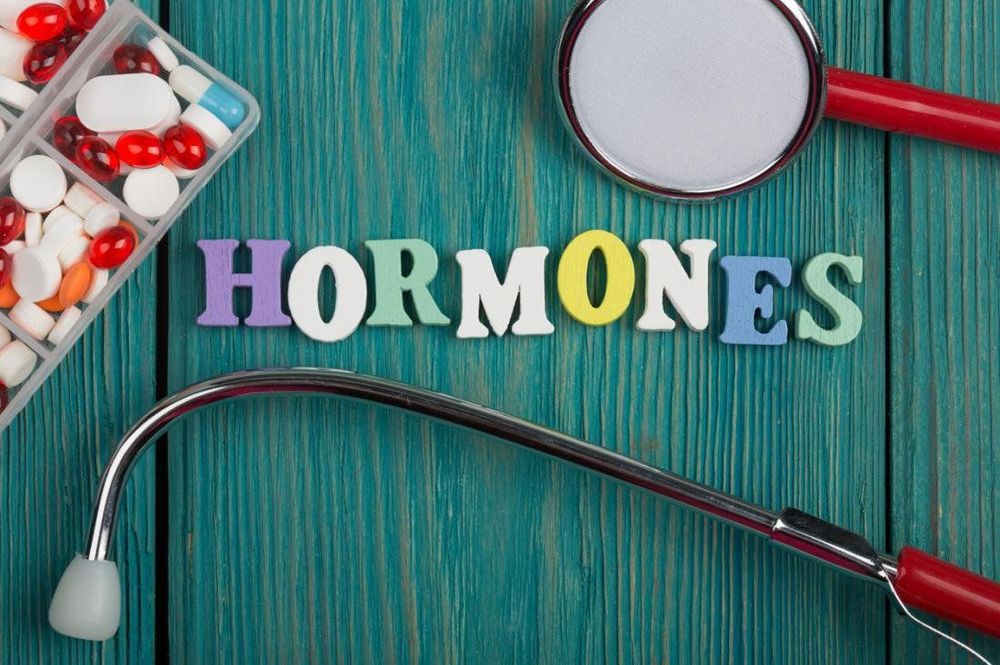This is an automatically translated article.
The thyroid makes hormones that help control many parts of metabolism, like heart rate and the rate at which calories are burned. Women are more likely to have thyroid problems than men. Studies have shown that 1 in 8 women is affected. The most common problems with the thyroid are hypothyroidism, when the gland doesn't produce enough hormone, and hyperthyroidism, when it makes too much.
1. Normal thyroid
The thyroid gland in the body, located in the neck, produces the hormones T3 (triiodothyronine) and T4 (thyroxine), which help control the body's metabolism. These p-thyroid hormones regulate heart rate, body temperature, and the conversion of food into energy.Thyrotropin-releasing hormone (TRH) from the hypothalamus tells the pituitary gland to release thyroid-stimulating hormone (TSH), so the thyroid gland secretes its hormone.
When blood levels of T4 and T3 increase, the hypothalamus and pituitary gland stop producing hormones, keeping blood thyroid hormone levels stable.
2. Signs of Thyroid Problems
If you have any of these symptoms and they don't even go away for a while, see your doctor for a thyroid hormone test to identify a thyroid problem.
Some signs of an overactive thyroid:
Fatigue Fast heartbeat Difficulty concentrating Increased appetite Sweating Anxiety, restlessness Unintentional weight loss Some signs of a low thyroid:
Fatigue Increased sensitive to cold Muscle weakness Brittle nails and hair Hoarse voice Unintentional weight gain

Tăng cân không chủ ý có thể do tuyến giáp thấp
Some signs of a low thyroid:
Fatigue Increased sensitivity to cold Muscle weakness Brittle nails and hair Hoarse voice Unintentional weight gain What causes subclinical thyroid problems
You can develop subclinical hyperthyroidism if:
You have the autoimmune disorder Graves' disease You have an enlarged thyroid containing nodules (toxic nodular goiter) You have thyroiditis (thyroiditis) You have been treated Overtreatment with thyroid hormone to treat hypothyroidism. You can develop subclinical hypothyroidism if you have a type of thyroid inflammation called Hashimoto's thyroiditis. You will then be treated with radioactive iodine (for hyperthyroidism), interferon alfa (for cancer), interleukin-2 (for kidney cancer), amiodarone (Cordarone, prescribed for heart rhythm) irregular), or lithium (for mood disorders).

Bệnh nhân bị viêm tuyến giáp Hashimoto
3. Some Thyroid Tests
The main task of the thyroid gland is to manage. This small gland located in your neck produces hormones that control how you use energy. They determine how your organs do their jobs on things like how quickly or slowly they use oxygen, make proteins, and respond to other hormones. Sometimes the thyroid gland doesn't work as it should. If the amount of hormone your thyroid makes is less than normal, it's called hypothyroidism. And conversely, if the thyroid gland makes too much hormone, then you can say you have hyperthyroidism.
Weight gain is often a problem for people with thyroid related diseases. If your thyroid isn't producing enough hormones, you can gain weight. That's because your metabolism slows down and your body builds up salt, water, and fat. If your thyroid is overactive, you may end up losing weight, sometimes without even trying to lose your weight. Women are more likely to have thyroid imbalances than men. Thyroid problems are less common in men. Women are about 50 times more likely to develop hypothyroidism than men. Some scientists think that female hormones, such as estrogen, will be the trigger for the thyroid gland. But this is still not explained with certainty from scientists or researchers with scientific basis.
Tired all the time? It could be your thyroid gland, in addition to fatigue and weight gain, you may experience depression, constipation, feeling sluggish, notice dry skin and hair, and muscle cramps. An underactive thyroid gland is associated with a slowed metabolism. An overactive thyroid means your system is always working at full capacity. Or it can make you tired.

Nếu tuyến giáp không sản xuất đủ hormone bạn có thể bị tăng cân
Most likely you have low thyroid: You will probably start to change in your late 40s or early 50s. Doctors aren't sure why this age group is more likely to have thyroid problems. However, they still raise suspicions that the thyroid gland may be involved in hormonal changes. Symptoms of an overactive thyroid can include: Look for signs of an increased metabolism. These can include weight loss, stress or anxiety, irritability, heart palpitations, more bowel movements, sweating, trouble sleeping, hand tremors, and muscle weakness. Changes in thyroid function during pregnancy are normal. Most of the time the route works as it should. But pregnancy can slow down or speed it up. Higher levels of hormones, like estrogen, change the levels of thyroid hormone in your blood. There is a link between autoimmune disorders and thyroid problems. Your immune system can attack your thyroid in a number of ways. Graves' disease will cause it to make too much thyroid hormone. Another autoimmune disease, Hashimoto's disease, causes chronic inflammation and disrupts hormone production.
Thyroid problems often run in families. You are more likely to have a thyroid problem if someone in your family has it. Your doctor should start thyroid screening tests when: After the first time, you should have these tests every 5 years. This is a simple blood test that measures the levels of thyroid-stimulating hormone (TSH) and other thyroid hormones in your blood.

Trường hợp tuyến giáp hoạt động quá mức có thể được điều trị bằng thuốc kháng giáp
Animal thyroid hormone is the best way to treat an underactive thyroid. The preferred treatment is thyroxine, a synthetic version of the primary thyroid hormone. For many years, thyroid hormone obtained from animals (mainly pigs) was used to treat this condition – and similar products are still sold today. But their quality and effectiveness can vary widely. The artificial version is much more secure. An overactive thyroid can be treated with: Antithyroid drugs that block the gland's ability to make hormones. Radioactive iodine damages the cells that make hormones. Surgical removal of the thyroid gland. Treatment will be based on your age, the type of hyperthyroidism you have, how bad it is, and other health problems you have. If left untreated, thyroid disease can lead to: If you do nothing about your thyroid disease, you increase your chances of developing a number of serious long-term conditions, including heart disease, stroke, osteoporosis, infertility and mental problems. Pregnant women are more likely to have miscarriages or other pregnancy-related problems. Thyroid problems lead to thyroid cancer. There is no evidence that thyroid problems cause cancer. But if you have thyroid cancer, you may also have an underactive thyroid. In order to achieve the highest diagnostic and therapeutic efficiency, Vinmec has equipped with the most modern imaging equipment today, typically the GE Healthcare S9 ultrasound machine with flat transducer, high frequency, high precision HD resolution for clear images. High-frequency ablation technique to treat thyroid tumors under ultrasound guidance allows the doctor to control the entire procedure, minimizing damage to blood vessels, nerves, trachea, esophagus, so it is very safe. and at the same time completely burned the tumor.
Periodically after 1 - 3 - 6 - 12 months, the patient will be re-examined with an endocrinologist and radiologist who has directly performed the procedure for the most accurate and objective assessment results. . If you have a need for consultation and examination at Vinmec hospitals across the country, please book an appointment on the website for service.
Please dial HOTLINE for more information or register for an appointment HERE. Download MyVinmec app to make appointments faster and to manage your bookings easily.
Reference source: webmd.com












